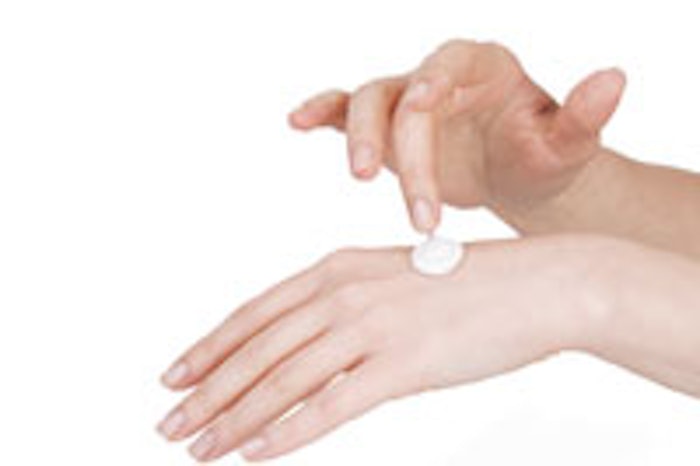
If early winter flakes aren't falling from the sky but instead from your skin due to xerosis—otherwise known as dry skin—then dermatology specialist Joshua Fox, MD, medical director of Advanced Dermatology P.C., advises you to take notice. Scientists have learned that a humectant-rich emollient containing high amounts of urea, an important component of skin's natural moisturizing system, relieves xerosis by removing scales, increasing skin hydration and reducing abnormal skin thickness.
New research published in the November 2013 print issue of Skin Research and Technology tested a new humectant-rich formulation comprised of 15% urea and 15% alpha hydroxy acids, which help slough off the dead skin cells common to xerosis—a name derived from the Greek word "xero," which means dry. Even normal skin became more resistant to external "insults" such as low humidity and was able to more efficiently hold moisture after use of the new cream, the study showed.
"While xerosis is quite prevalent—especially in winter, when temperature and humidity levels plummet—it's gratifying to see that science is still finding new and better treatments for this age-old nuisance," Barry Silver, MD of Advanced Dermatology in Summit says. "This new study adds to evidence we already have indicating that humectant-rich and oil-based creams and lotions do a better job at treating xerosis than water-based products."
What causes xerosis?
While people of all ages can develop dry skin, a December 2011 study in the journal Dermatology showed that older adults are disproportionately affected, with more than half of those age 65 or older coping with the condition. But retaining moisture in the skin is more difficult as we age, leading to dry, itchy and scaly skin, especially on the arms and legs. Xerosis can also be triggered by many factors Silver mentions the most common environmental factors, including:
- Scrubbing or over-cleansing the skin;
- Bathing too frequently or with excessively hot water;
- Toweling off too vigorously after bathing;
- Living in areas with cold, dry winters or low humidity;
- Heating your home or workplace with central heating systems; and
- Over-exposing your skin to the sun, even in cooler temperatures.
People with any of these risk factors for xerosis may deal with symptoms ranging from skin that feels tight, especially after bathing; to red or pink irritated skin; fine skin cracks; or white, flaky skin, Fox says. "It's remarkable how miserable dry skin can make us," he adds. "Fortunately, many home remedies exist for xerosis that can not only make us more comfortable, but prevent the deep skin cracking that can lead to dangerous infections."
Dealing with xerosis
Dry skin can't always be prevented, but modifying your daily routine can help treat already existing symptoms. Fox recommends these commonsense measures:
- Use oil-based and humectant-rich moisturizers frequently, especially after bathing. Look for products containing high amounts of urea and alpha hydroxy acids;
- Avoid bathing or showering in very hot water or for long periods or excessively;
- Avoid utilizing wash cloths or loufas;
- Use gentle soaps and cleansers without added dyes, fragrances or alcohol;
- Pat the skin dry gently after bathing without rubbing;
- Avoid excessive water exposure, such as that from a hot tub;
- Stay hydrated by drinking plenty of water;
- Avoid scratching affected areas;
- Use a sunscreen on all exposed skin when heading outdoors; and
- Use a home humidifier to increase the moisture level in the air.
"These are good, solid techniques that for most people will provide quick relief or prevent the problem from worsening," Silver says. "But if your skin is oozing, has large areas that are peeling or doesn't improve within a few weeks, seeing a dermatologist is a smart move. You may have an infection—which can potentially be serious if bacteria enter the blood vessels—or have another skin condition unrelated to xerosis like psoriasis, eczema, or atopic dermatitis. We can also help determine the right prescription medications or products to help you heal quickly."
Advanced Dermatology P.C. and the Center for Laser and Cosmetic Surgery (New York & New Jersey) is one of the leading dermatology centers in the nation, offering highly experienced physicians in the fields of cosmetic and laser dermatology as well as plastic surgery and state-of-the-art medical technologies. www.advanceddermatologypc.com.
Joshua L. Fox, MD, FAAD, is the founder and medical director at Advanced Dermatology P.C. He is a leading authority in the field of dermatology with expertise in skin cancer, cosmetic surgery and laser procedures and is program director of a fellowship in laser and cosmetic surgery. Barry Silver, MD., FAAD, is an associate with Advanced Dermatology P.C. in NJ. He is board certified in dermatology.










